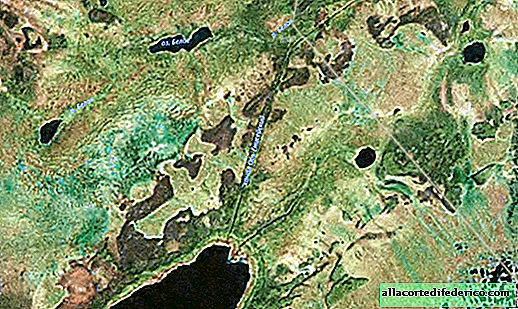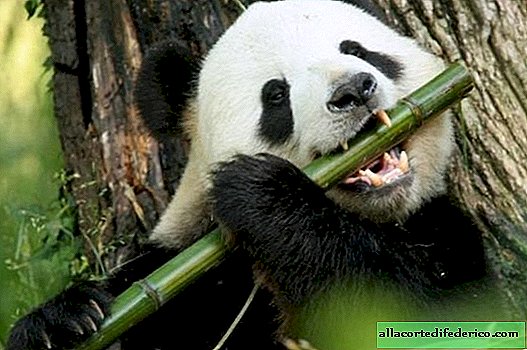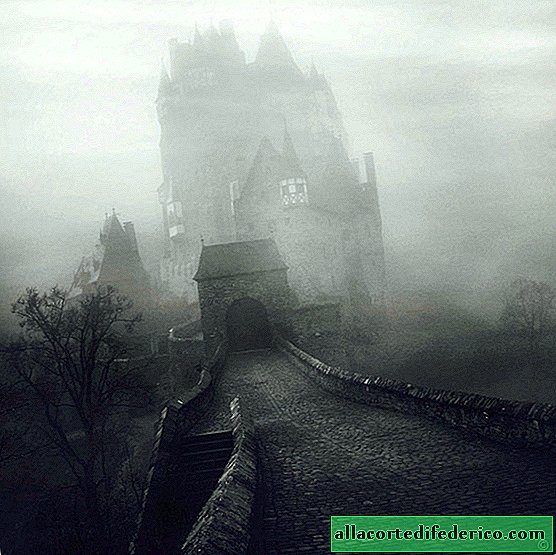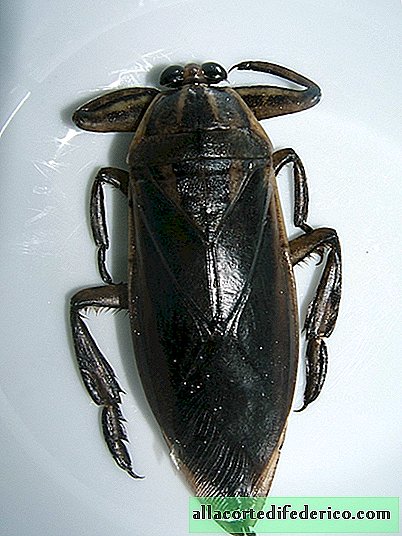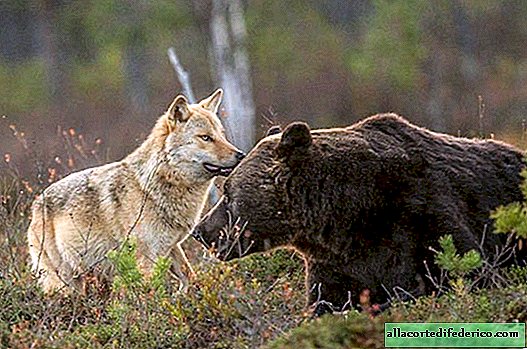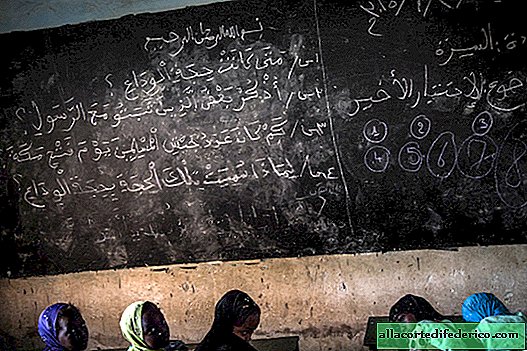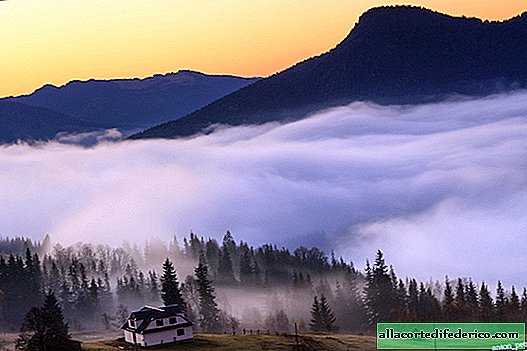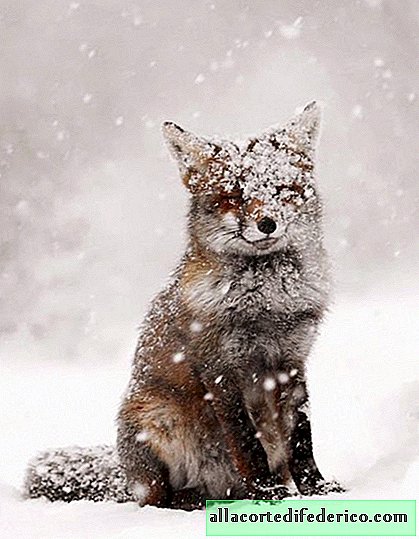Bear grandfather
Where the forest came close to the village, a young man walked along the path, dressed in camouflage and wading boots. Gloved hands, only a nose and a short beard were sticking out from under the pulled hood. On a wooden yoke, he carried two large buckets. I followed him, trying not to make noise and knowing that, despite all the tricks, they already knew about our visit. But here is the wicket from the netting net. The bearded man unlocked her and gestured, not uttering a sound, showed - stand here and look.
Taking one bucket, he went inside, there was a rumbling, and I saw how hungry bear eyes stared at him from all sides. Vasily - that was the name of the young man - silently walked between the animals, dumping a portion of porridge and dog food in front of each. Suddenly one of them became worried, rose to his hind legs - he smelled the smell of a new man. He stood, thought, and returned to feeding.
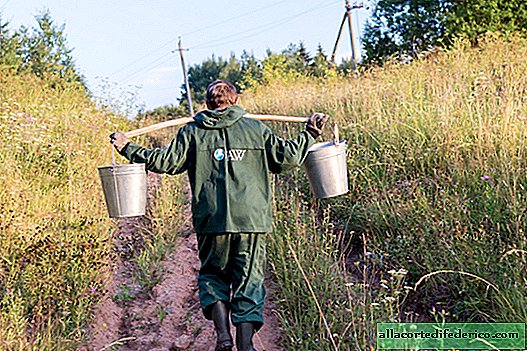
It is not easy to get to the village of Bubonitsy. Now this is a bearish corner in every sense - on the outskirts of the Tver region, at the end of a dead end covered with potholes. However, local residents do not consider themselves provincials. For geographers, the Great Valdai watershed is interesting, from where the Volga flows to the east, the Dnieper to the south, the Western Dvina to the west, and Lovat to the north, and the intersection of ancient trade routes for historians. Is it any wonder that it was in these parts of the world where a place of true pilgrimage for zoologists came to, where they come from all over the world to exchange knowledge and look at a bear boarding school lost in the forest?

Thirty years ago, the village was dying - only two old people lived in it. Now there are a dozen strong houses, widely scattered on sandy hills. This miracle happened thanks to the biologist Valentin Pazhetnov, whom the villagers respectfully called Grandfather. I walked along a winding road, trying to find his house for a special sign - the Russian flag was supposed to fly on it. Grandfather raised the banner of his country from the roof since Soviet times. To many, this seemed strange. They even came from the city committee, asked to take off - they say, the flag was put only on the village council, in extreme cases - on holidays. To which Grandfather innocently asked whether there was a law prohibiting the hanging of Soviet flags. The uninvited guest just shrugged and left the stubborn zoologist with nothing.

I found the flag on the very first house. I went into the gate and asked the unshaven village men at the diners at the wooden table how to find Grandfather. Those unexpectedly answered in English. It turned out that Grandfather lives higher, the Russian flag can now be found on almost every hut, and funny collective farmers are foreigners who came here to spend their holidays in the Russian outback. Where in Western Europe you will find such a forest!
But here is the house at the very top of the hill. At the entrance - forged bears, in the hallway - a whole set of bear trinkets - gifts from different countries. The owner of the house itself is similar to the clubfoot: with strong hands not of age, a tanned wrinkled face and slightly slanting, lively eyes. Neither give nor take - a forester from old tales.

Almost all the revival stories of Russian villages that I had heard were made by a newly arrived couple, usually from the townspeople. Full of energy, they left the city for the sake of the rural wilderness and transformed everything around them, breathing new scorching life into a scattering of decrepit houses. Bubonitsy were no exception. But the path that brought Valentin and his wife Svetlana here was neither short nor simple.

When we talk about the creator of a boarding school for orphans, the imagination vividly draws a kind of doctor Aibolit, who will not touch a mosquito with his finger. And indeed, even now, when the bear rescue center has long been managed by his son Sergei, Valentin and his wife feed the newborns cubs all night long - an exhausting work that can bring joy only to one who truly loves animals. It is hard to imagine that this man who saved hundreds of bears loves potatoes in bear fat, ate capercaillie instead of bread and brought his wife fried squirrel heads, which in Siberia were considered a special treat.

“I have been hunting since childhood and still respect it,” he says, treating me to cottage cheese. “But only if she's not for fun.” Those who shoot from the tower for three hundred meters at the beast, not suspecting of danger, let it be better to shoot at the dash. There should be a confrontation between your skills and knowledge with the skills of the beast. So he had a chance to escape. This is a very difficult job, and not at all romance, as I once thought. It was necessary to feed himself and his family, to get those animals for which they paid: sable, squirrel, column ... But I went to the bear, because the family needed lard and meat. He walked and mined.

For many years he wandered through the taiga, often finding himself close to death. He learned to get close to the most secretive inhabitants of the forest, hunted the best four-legged hunters, tracked down natural trackers, whose nose and ears are much more perfect than human ones. Sometimes a contest dragged on for a long time, like a long-standing duel with a seasoned bear, Vorchun, "in which robbery was alternated with calculating wisdom." Having suffered from poachers, Grumble began to take revenge on people - frightened mushroom pickers, mugged in the village and with almost mystical luck escaped from the huntsmen pursuing him. In the end, the old lame beast and left undefeated. Until now, Grandfather remembers his opponent with great respect. In order to survive in this harsh world and feed his family, Valentine had to understand animals in a way that cabinet zoologists could not imagine, live among bears, and learn to think like them. Hunting a predator, he approached him like no other. The childhood dream came true, and the reward for the labors was great. Grandfather's memories of how he first crept into an oat field and lurked between feeding bears, breathe with delight and high poetry:
"In this lunar world with a beast that did not suspect that a strange creature, not from their tribe, was lurking nearby, I suddenly felt that I was gaining an invisible but tangible connection with animals, imbued with their desire to get enough, gain strength, to live simple , an ingenuous life, leaving behind him the same simple, pure, naive creatures to continue a kind on earth. "

In 1974, a former hunter and huntsman, who had mastered several dozen professions by that time, began the main business of his life - the scientific study of bears. To do this, I had to fulfill the condition: to work out the director of the reserve for three years. The time had barely expired when Valentin resigned from his commanding powers and went into the forest for a week, as if purifying himself before a new life.
It was decided to take the first cubs for the experiment from the den, and it almost cost Valentin his life - an enraged bear jumped out to meet him and only at the last moment was frightened by the scream and blows of the ax that an experienced hunter had beaten to the wood with all his might. He took the cubs and fed them until late fall, living in a tent next to the adopted pets. The cubs obediently ran after the two-legged “mother,” and when it began to get colder, they even tried to attach themselves to her under the barrel. I had to whip them with twigs on curious noses, because the addiction of the beast to a person, the erasure of the inborn fear of him doom the pet to certain death. No one will stand on ceremony with a clubfoot, who will come to the village to play with people. Fortunately, just before winter, the cubs left without a warm tent themselves began to dig lairs, moreover, as deftly as if they had already done so many times. It became clear that the pupils were able to survive in the wild on their own.

Since then, biologists have raised about two hundred orphans. They are being taken to Bubonitsky "boarding school" from all over Russia. Somewhere poachers will kill the she-bear, but the hand will not rise on the cubs, somewhere the careless skier will disturb the furry mother in the den. Having run away once, she will never return, and if the cubs are not taken, they will simply freeze. The fact is that a bear in a lair is a very convenient prey; a man has hunted him for centuries. The “brave men” returning to their winter home were often ambushed, so the genes were mostly transmitted to the offspring by “cowards,” who left both the shelter and the babies sleeping in it.

Newborn cubs appearing in early January are tender lumps with closed ears and eyes, so tiny that in the Middle Ages people thought that a bear bear gives birth to shapeless pieces of flesh and only then, licking, slowly gives them the shape of animals. It seems impossible to turn them into full-fledged forest owners. Meanwhile, even a premature teddy bear with crimson bald spots instead of skin, which weighed only 356 grams, managed to get out at the Bear Rescue Center.
At first, the young animals are kept in a warm room near the stove, which replaces the side of the mother-bear. Employees change diapers for them, massage their tummies, plant them on a pot, and in the first ten days of life they feed them every two hours, day and night, pouring five milliliters of milk into a tiny mouth. “As soon as you get home, you need to go back,” Svetlana smiles.


The tiny teddy bear is a walking plush toy. It is worth seeing how the young animals, screeching, suck each other’s ears, and even with inveterate cynics their hands themselves reach out to stroke brown wool. But you can’t. Even talking in the presence of animals is forbidden, and if you become a family for months of vigilant - in the literal sense of the word - care cub will reach for you, you need to mercilessly punish him. Offend and thereby save. Of course, misfires happen anyway. It happens that young outgoing bears go to the village. Then they are taken back to the "boarding school" and taken care of them until their hibernation. In the lair the beast runs wild, and in the spring headlong runs away from its saviors and from other people.

These experiments are not simple charity, but serious scientific work that has already brought considerable results. Sixteen clubfoot “graduates” again settled in the empty Bryansk Forest reserve. Now there are more than fifty bears in it. In the remote places of Tver, international conferences on the Pazhetnov methodology are held in India and South Korea. But the greatest joy for adoptive parents is when they see former pupils already with their own cubs. And this means that not only bearish, but their own life makes sense.

And yet I can not help asking the former hunter a question:
- Do not mind when your bears get?
Grandfather looks at me in bewilderment:
- How can it be a pity when they live a normal bear life? Hunting keeps the beast at a distance from humans. There is simply no other mechanism. Of course, this should be done by specialists. In Tanzania, for example, they work with elephants - they divide the country in half: in one half they hunt, and in the other they show animals to tourists. Otherwise, they will devour everything and the case will begin. Then they are swapped.
When hunters get our bear, they believe that they did wrong, but do not be shy. This is the same information. The recent male from the Novgorod region was almost seven years old, and found him only six kilometers from the place of release. The farthest exit was the dipper during the rutting period - two hundred kilometers in a straight line. There are no longer solid forests, as here, but mixed with a field. The hunter with binoculars saw the mark and called us. Then she ran back here. Home.

Now Vasily, the grandson of Grandfather, is carrying food for the cubs. Great-grandchildren are growing up. The forgotten village came to life, turned into a real family nest of the Pazhetnov family. In the early nineties, sometimes it was necessary to feed the orphans for their own savings, now under the patriotic Russian flag the emblem of IFAW - the International Animal Welfare Fund, which finances the bear boarding school - flaunts. And in his free time, Grandfather writes memoirs and tales for numerous descendants, so much so that sketches from the life of moose and wild boars are read in full swing, like good detectives.
“My grandmother and I are very Russian people,” he says proudly. - For us there is nothing better than our place. One journalist wrote that in our village it stinks of manure. And I am very sorry that such villages have not been preserved in many places. Live, not sterile.

At these words, Grandfather slowly, as if with difficulty, smiled, and the harsh face of the forester suddenly changed, as if a sunbeam had pierced through the branches of a dense forest. And I realized that this man, who knows how to value life with all its filth and tragedies, in his travels learned the main thing - pure love, when for the sake of happiness of the creatures you care about, you need to abandon all external manifestations of attachment, let them go from you in time, and if necessary, calmly accept even their death, knowing that this is also the price of freedom that you gave them. The main thing is that their forest life, albeit fleeting, was real.


